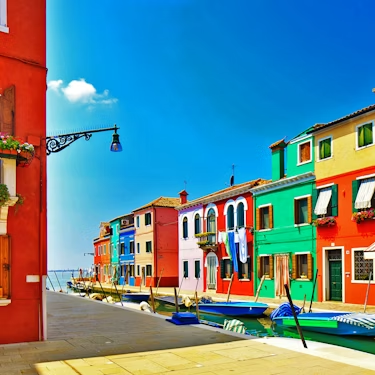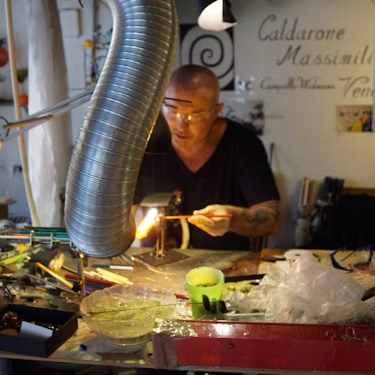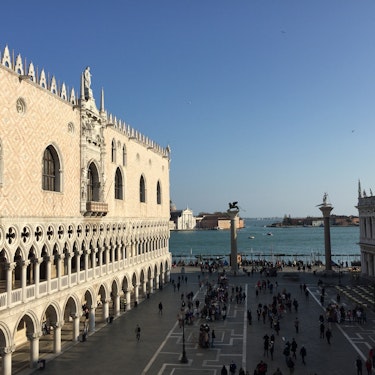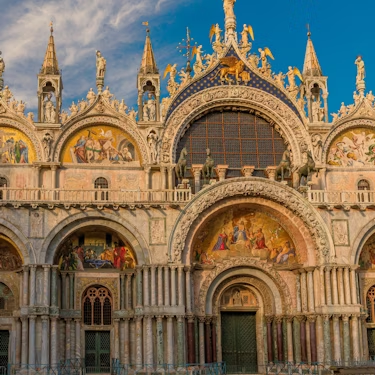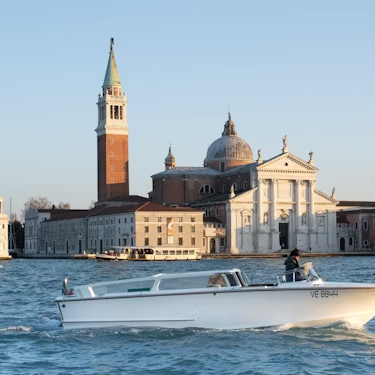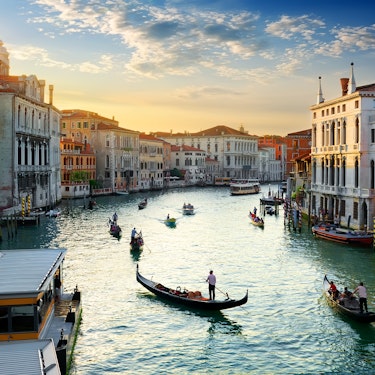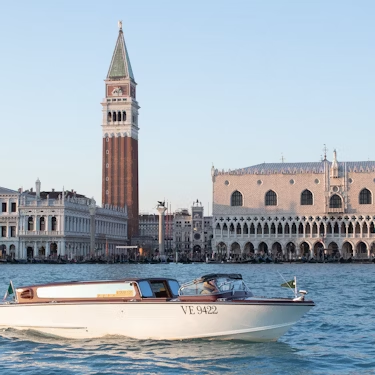More about: 12 Things to Do In Murano
Of the 118 islands that make up the Venice Lagoon, Murano is one of the best known. Famous the world over for its prolific craft industry with spectacular glass creations, there are many things to do on Murano.
Before you start your trip to the island, it will be useful to have a map of Murano with the most important sights below. I hope the list of ideas shared below will inspire you to have an amazing trip.
1. Visit the Murano Cathedral

If you are coming from Venice on your trip to Murano you should take the time to visit the official cathedral of the small island better known as the Basilica of Saints Maria and Donato.
Its construction dates back to the 7th century and over the years it has undergone several alterations, the most important in the 9th and 12th centuries. The floors and mosaics made of marble and glass have been preserved from the original design.
The interior decoration is notable for the ceiling and its magnificent representation of Byzantine art with a decoration of the Virgin Mary praying against a gilded background. Pay special attention to the relics of San Donato and the four giant ribs hanging behind the altar.
2. Visit the Murano Glass Museum
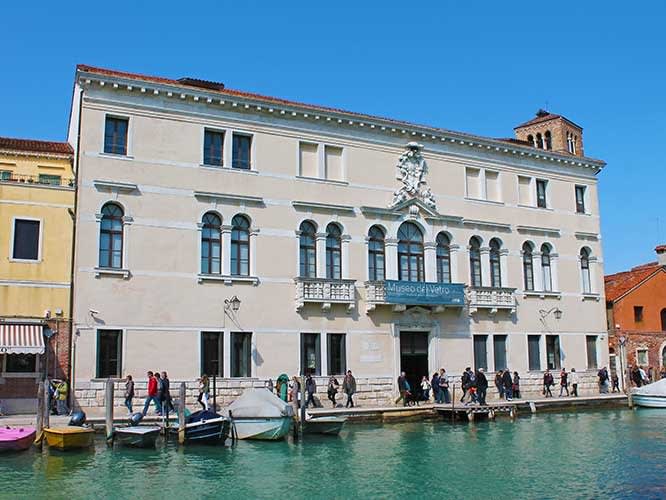
If you want to learn about the art that has made this town famous, a stop at the Glass Museum is a must. Located near the Palazzo dei Vescovi, its façade exhibits the flowery Gothic style characteristic of Venice and was built in 1861.
Inside you will find a total of 9 exhibition rooms, with a permanent collection of works that show the talent of Murano's artisans at its best, in addition to learning about the history of the island and its relationship with Venice.
According to records, in 1291 the Venetian glass workshops were moved to Murano for safety reasons, as Venice was the victim of numerous fires. For this reason, the entire Venetian glass industry moved to Murano where the new workshops were built.
3. Discover the traditional glass factories in Murano
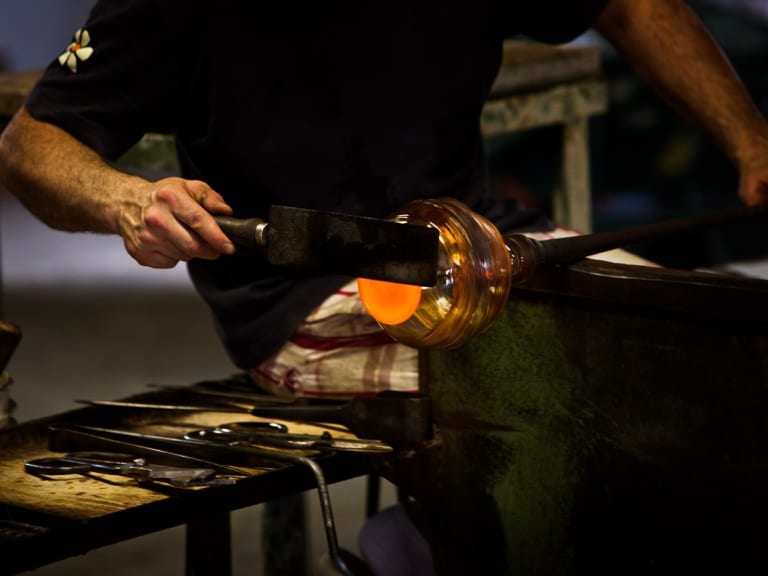
It is important to know that Murano glass making is not an art relegated to the history books, on the contrary it is a permanent and evolving art that many Venetians live by. Due to its popularity, Murano artists have opened their workshops, so you will have the opportunity to see a live demonstration of glassblowing.
On your visit to Murano I recommend wandering the streets to see some of the traditional artisan workshops, here are some of the best known.
- Bruno Fusato Signoretti: his work and dedication made him one of the most respected artisans in Murano and all of Venice. Although he passed away in 2014, his workshop and shop are still open to the public, now run by his daughters.
- Massimiliano Schiavon Art Team: his creations have made him world famous for the wonderful way he plays with colour and creates strange, unique and perfect pieces. In Murano there are two showrooms dedicated to Massimiliano Shiavon's art.
4. Take part in a glass workshop in a studio in Murano.
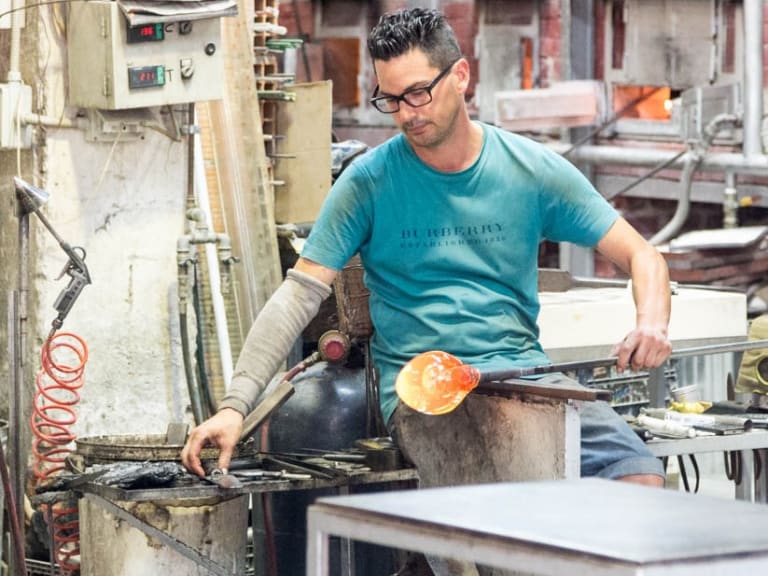
If admiring the artists' works and watching them being made live is not enough for you, how about creating the pieces yourself? Among the unique experiences offered by a trip to the Venice lagoon is the invaluable opportunity to learn the secrets of its techniques.
Experienced artists offer didactic Murano glass workshops where you can learn how to make glass beads, small objects in the shape of animals or learn the basics of glassblowing.
Murano glass workshops are usually basic courses focused on beginners, so don't be afraid if you know absolutely nothing about the subject. The idea behind the experience is usually to have fun learning something new.
5. Get to know the Grand Canal of Murano and the secondary canals

Murano is made up of numerous islands connected to each other by bridges and canals. Like stunning Venice, it has its own Grand Canal, albeit on a smaller scale.
This means that you can explore the main canal and the side canals with a leisurely, short boat ride. You're sure to find far fewer tourists than on Venice's Grand Canal cruises.
On your tour you'll find several landing ports and the Ponte Longo, the only bridge on the Grand Canal in Murano and connecting the islands of Donato and San Pietro. It is also a good spot to take fabulous photos of the water and the surrounding buildings.
6. Explore the alleys of Murano on foot.

Made up of a total of 7 individual islands linked together by beautiful bridges, the entire island of Murano measures just one mile and is easily walkable in 30 minutes or less. It's worth taking a moment to wander the alleys, walk the beautiful bridges, admire the old houses and enjoy the everyday life of a town much more relaxed and less crowded than the larger Venice.
7. Stop for lunch

On your walk around Murano take a moment to enjoy the local cuisine, after all, walking among museums, factories and workshops can be exhausting. Here are some of my favourite options, but feel free to explore the many alternatives the place has to offer.
- Restaurant alla Vecchia Pescheria: seafood is the speciality of the house, but you will find a varied gastronomic offer, whether you are looking for a full meal or a light lunch before continuing your journey.
- Osteria al Duomo: This informal tavern opened its doors to the public in 1903 as a collective property owned by 50 Murano families, and the tradition has been maintained to this day. It is the ideal place to eat if you are visiting Murano with your family because of the warm aura and friendly atmosphere that pervades the place. Plus, the pizza is excellent!
- Ai Bisatei: is where the glassblowers head to eat fried fish, risotto or a good pasta dish such as clams. It's a simple place to enjoy a good meal in an extremely pleasant atmosphere.
8. See the other churches

On your tour of Murano you will come across other beautiful churches that are worth visiting. Pay special attention to the following:
- Santa Maria degli Angeli: located on the island of San Donato, this church and convent began to be built in 1118. In Renaissance style, this church enjoyed great fame when a papal bull joined it to the church of Santa Maria di Piave on the Lovadina. Sadly the church was closed in 1848 and many of the marvellous works contained within were removed. Today it can only be admired from the outside.
- San Pietro: located near the San Pietro Martire bridge, it is one of the oldest buildings on Murano. It was built along the lines of Gothic architecture and dates back to the 14th century.
9. Don't miss the Palazzo Da Mula.

You cannot leave the island of Murano without visiting one of the most famous buildings on the island. The Palazzo Da Mula has a beautiful brick structure, characteristic of the island's buildings, and is notable for its rich decoration, where Istrian stone is used in a marvellous way.
Its façade exhibits the characteristics of the Venetian Gothic style, being decorated with tiles and paterae dating back to pre-15th century times.
When admiring it, pay special attention to all the architectural details that characterise it such as the arches in the loggias with their peculiar circular holes, the contours on the windows and the jambs on the doors.
10. Visit the Campo Santo Donato

Leaving the Murano Cathedral you will come across a small and pleasant enclosed square. This square is called Campo San Donato and the most beautiful element of the place is the fantastic stone well located in the centre of the square and catalogued as one of the oldest wells on the island.
Its sides are exquisitely decorated with a semicircular arch supported by columns and candles in each corner.
11.Visit the Roman Column and Column of the call

On Murano you will find some peculiar colonnades that serve as historical attractions on a tour of the island.
- Roman Column: this is the first attraction you will come across when you get off at the port of Murano. It is an ancient column made of Roman granite that has been leaning over time. For centuries it played an important role as the pedestal of the statue of Doge Domenico Contarini.
- Column of the Call: located next to the Ponte di Mezzo, its name comes from the fact that the messenger of Venice used to dock here to read the ordinances dictated by the Doge or the Venetian magistrates. You will recognise it easily as the Lion of San Marco is placed at the top.
12. Visit the Murano Lighthouse
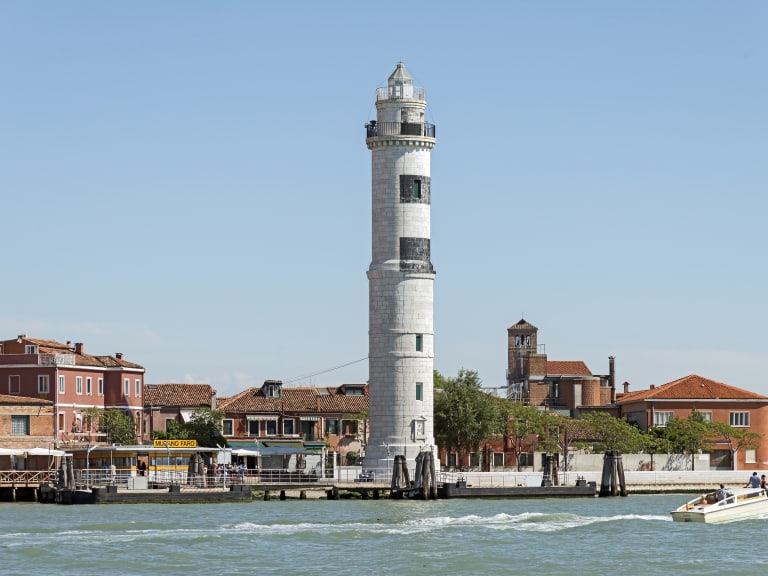
On the island of Santo Stefano, on the east coast of Murano and close to the harbour is the Murano Lighthouse. If you intend to continue your adventure to the islands north of Venice, you can take the Vaporetto from this port to Burano.
The construction you will see is largely the result of renovations made at the beginning of the last century, but historically the Murano lighthouse has been placed in the same location. The first construction was made entirely of wood and then in 1912 it was replaced by an iron structure.

